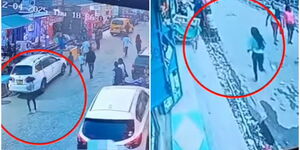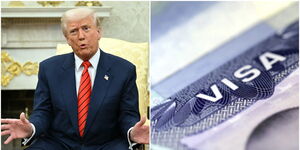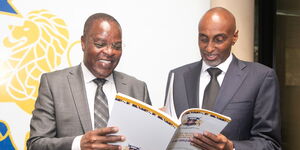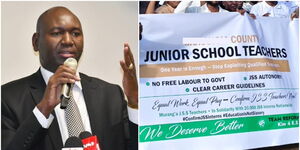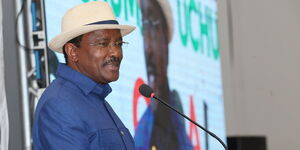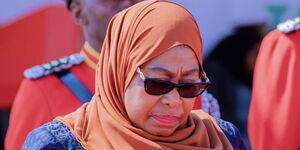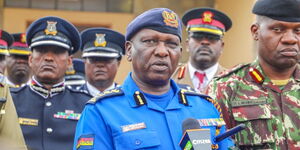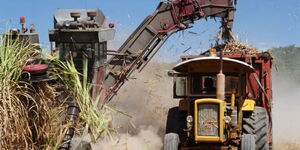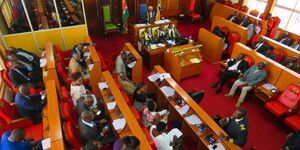When former president Daniel Moi passed away on February 4, 2020, celebrated Citizen TV editor Linus Kaikai hosted a panel of politicians on his show that night.
The panel had five politicians dissecting the late president's legacy, depending on their experiences.
It was an abrasive discussion, understandably due to the calibre of the participants, amongst others Koigi wa Mwere, and former Runyenjes MP Njeru Gathangu - the pair that tended to dominate that discussion.
A chat with Njeru Gathangu portrays a no-holds-barred, shoot-from-the-hip kind of character that couldn't do well careerwise in the army, for the former military man - hence, an early exit.
Njeru plunged into politics, after pursuing a political science major.
At the time, the country's political landscape under President Moi was very fragile. The fluidity of power had the president employ partisan, and often unpopular techniques to keep it together.
The government hadn't yet recovered from the 1982 Coup Attempt shocker, and soon after - The Mwakenya Movement was born.
Paranoia ran high in government corridors - it was a bad time to be vocal. Random detentions of selected vocal personalities became the order of the day.
This led to the infamous tortures in the dark basements of Nyayo House.
It was under these circumstances that former Runyenjes MP Njeru Kathangu was arrested on July 11, 1990, at Mutugi’s Bar and Restaurant in Dagoretti Corner.
Also arrested alongside Njeru was George Anyona, Prof. Edward Oyugi and Prof. Ngotho Kariuki.
They would spend the next 15 days incarcerated in sealed, dark basement cells.
If there's an episode of this country's ever-shifting political thriller that gets the seasoned politician pensive and bitter, it's the Nyayo House torture memories.
Njeru Kathangu narrates his ordeal, in the first person:
“Between the time of entering the cell and beginning of the interrogation, there was nothing - no food, nobody talked to me.
There was no need for a short call. I guess it was July 13th or 14th that someone came and opened the cell door. I was blindfolded and led to the lift.
Nobody was talking to me all the time. I was taken upstairs.
“It was bright and sunny. There were about twelve men and a woman sitting in a horseshoe formation. I was seated in the middle of the room in front of them. They started throwing words wildly and at random.
This was an uncoordinated way of interrogating people. One of the questions from Opiyo (The most-visible Nyayo House interrogator) was:
‘Tell us General, were you the person to become chief of general staff in your government? George Anyona says that you were recruited specifically for that.’
“After those wild statements, I got an opportunity to speak. I told them I was surprised that the Kenya Police did not appreciate how difficult it was to overthrow dictators. This was the first time I was slapped by someone from behind me.
He asked, ‘Who is a dictator here?’ I didn’t answer that.
James Opiyo rose and walked to where I was sitting and pretended to slap me. I raised my hand to protect my face. The man behind me slapped me again.
At that time Opiyo challenged me to stand and fight saying that if I could not fight I would be taken back to the cells. I stayed in the cells and I was not given any food.
“The following day I was taken back to the interrogation room and given some pieces of paper stating that we were going to overthrow the government. They asked me to comment on them. I denied them and complained that I had not eaten since July 10 and demanded to be given food.
I was given some bread and cigarettes to smoke.
After that I was taken down to a cell which was flooded with water. The water reached the ankle. After about two hours they introduced hot air in the cell via vent on one of the corners. I started feeling dizzy and I fell in the water.
All the while, I could hear muffled screams and wails through the thick walls.
While in that state I heard the noise of a woman who was in high heels walking back and forth and shuffling some papers. My body was very cold.
“In the morning I was taken up again to a smaller, slightly darker room where I met Opiyo and another torturer known as Mr. Machiri. They challenged me saying that I was involved in covert activities intended to overthrow the government.
I denied being the architect of Saba Saba (events of July 7, 1990 that led to the killing of tens of Kenyans by the police when they attended a pro-democracy rally at Kamukunji grounds in Nairobi) or having any potential to overthrow the government.
At this stage, Machiri walked out of the room and Opiyo told me.
‘Kathangu, you are an official of KANU and an army man. Why should you be involved with ex-detainees? Please assist us. Tell us about the other three people.’
I declined to respond and Opiyo left the room.
“Immediately after, a brown woman with a Kikuyu accent came to me and said ‘Kathangu, you have not eaten. Why should you torture yourself? You have a wife and children and here you are protecting people who cannot assist you.’
I asked her, ‘Who are you? A policewoman?’
‘It does not matter,’ she replied, ‘I want to assist you.’
She started fondling me everywhere and telling me that she could assist me get out of the place if only I confessed to having been misled to overthrow the government. She continued fondling me until I pushed her away.
She raised the alarm and Opiyo came back. He gave me a blow on my head and I fell down.
He beat me with a wooden chair leg and rubber whip until I could no longer stand. He then summoned some people who came and dragged me downstairs.”
"The next four days the cell was flooded. They'd play weird sounds over small speakers in the walls. By now my body had a lot of sores and wounds. Some of my colleagues spent up to seven days in water.
"They would routinely pick us up and take us to a room with lots of people, say thirty or so, and order you to strip naked. They would hold your balls and mock you. It was very humiliating."
Kathangu, with others, was tried for sedition and convicted.
Later on - after months in jail, and a series of violent protests in the multi-party campaign, they were pardoned.

